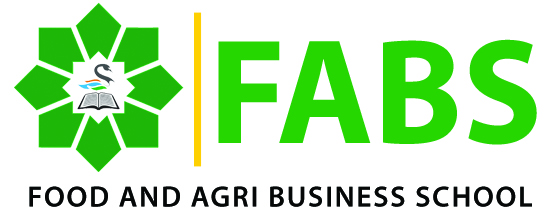This course provides a holistic exposure to understanding of concepts and inter-relationships among agro-climatic conditions, natural resources, food, agri and allied production systems and livelihoods of rural people. The rural resources include land, soil, climate, water, livestock and forests; the production systems encompass agriculture, horticulture, sericulture, forestry, animal husbandry & dairying, fisheries along with the non-farm activities that contribute to the livelihoods of rural people. The livelihoods of people are dependent on the production systems they have developed subject to the constraints imposed by the quality of natural resources and technology. Course helps to appreciate linkages between food and agriculture production systems to lives and livelihoods impacted by climate change and achievement of sustainable development goals.

ILT-1
AICTE Approved 2Yrs. Full Time ProgramPGDM-ABM: ILT -1 Brief Description of Course
Agro Ecology and Production Systems - 6 credits
Food and Agri Business Environment- 3 credits
Agribusiness and agroindustries are characterized by raw materials that are usually perishable, variable in quality, and not regularly available throughout the year. These characteristics represent non-negligible and often uncontrollable sources of risk for most agrobased investments. The sectors are also subject to stringent public sector regulations, not only because of concerns about food product safety and quality, but also in view of their significance for food security and political stability.Enabling environments are forged by the traditional, broader macro-level forces (political, social and economic) that are relevant to other sectors of an economy. However, specific additional factors were also identified as essential for driving further development of the agribusiness and agro-industries sectors: efficient land markets and tenure systems; access to appropriate rural and agricultural finance and risk management products; specific regulatory provisions, consistent trade policies and access to global markets; availability of skilled human resources, improved technologies and adequate infrastructural facilities and utilities (particularly rural roads and storage facilities); and capacity for complying with food quality and safety standards.
Organisation Behavior - 6 credits
This course provides framework to the students to understand the human behavior dynamics in work organizations through the study of the individual, the group and the organizational system. The course is designed to develop an understanding of behaviour of an individual and groups in organisational setting. Diagnosis and Prediction of Individual Behaviour; Group Behaviour- inter and intra, Organisation Culture and Traditions; Inter-Personal Skills and sensitivity. The course is designed to provide an understanding of self, personality, perception, motivation and team work in an organisation context.
Computing for Business Analysis - 6 credits
This course is designed to impart understanding of basic concepts, techniques and methodologies for analytical decision-making across the spectrum of managerial tasks and functions using Excel. Topics covered in this course are: Collection, Presentation and Summarisation of Data; Probability Concepts; Basic Distributions; Correlation and Regression; Methods of Sampling; Index Number and Time Series Analysis. This course helps students to understand and formulate managerial situations in a decision theoretic framework. It focuses on developing skills in structuring and analyzing problems and to inculcate the attitude of developing an executable solution to the problem with the help of some statistical techniques using Excel.
Managerial Analysis & Communication - 3 credits
This course will help students in understanding the managerial contexts & techniques of business communication. The main objective of this course is to help the students learn how to analyze a case for managerial decision making. More specifically, it aims to: (a) help the students learn about case method of learning, sharpen their analytical skills, and learn to use systematic frameworks for managerial decision-making, and (b) help the students to sharpen their written analysis and communication skills through practice of case analysis and presentations.
Managerial Accounting - 6 credits
The course is designed to provide an understanding of the role and relevance of accounting function in an organisation and also the basic concepts, techniques and methodologies relevant to accounting function and Generally Accepted Accounting Principles. Fundamentals of Accounting: Basic understanding of accounting, Conceptual framework of financial statements Business transactions to trial balance, Trial balance to Balance sheet and profit and loss account for non-corporate and corporate entities. Asset Valuation: Valuation of Tangible Fixed Assets, Depreciation on fixed assets, valuation of assets under finance lease and intangible assets, amortisation and asset impairment, Valuation of inventories, valuation of investments. Understanding Corporate financial statements: Corporate Balance sheet, corporate profit and loss account, Notes to the accounts and significant accounting policies, understanding and constructing corporate cash flow statement, other financial reports- Auditors report and Directors report, corporate governance report. Financial Statement Analysis: Financial Statement Analysis using the tool kit of Multi step Income statement, horizontal analysis, common size analysis, Trend analysis, Earning per share analysis, Ratio analysis, analysis of cash flow statement. Contemporary issues in financial Accounting: Global financial reporting, GAAPs and IFRSs, IAS, Indian GAAP and US GAAP, Foreign currency accounting, Inflation Accounting, Human Resource Accounting, Environment accounting, Responsibility Accounting.
Managerial Economics - 6 credits
The basic objective of this course in economics is to familiarise the students with the fundamental economic principles, and to examine the ways by which these principles could profitably be employed in the context of managerial decision-making in food, agri and allied businesses. This course deals with micro-economic issues and principles involving households and firms, mainly in the areas of Demand and Supply; Production and Cost of Firms; Price/Output Decisions by firms under varying market conditions; and factor pricing. Focus is to familiarise students with the concepts and analytical tools from micro economic theory that are useful to managers in making decisions at the firm level in the modern food, agri and allied industry – whether the business is directly involved in production, value-additions to raw agricultural products, or provides support services including the distribution, processing, packaging, and marketing of agricultural products.
PGDM-ABM: ILT -4 Brief Description of Course
Total Quality Management 6
TQM is applied in many organizations with the objective to improve product quality and increased customer satisfaction and is divided into six elements: top management commitment; customer focus; supply chain quality management; people management; continuous improvement; and process management. It is widely accepted that Quality Management Systems approach is indicated to ensure quality of products and services. Furthermore, Total Quality Management, Six Sigma, ISO Standards and Hoshin Kanri have established as important management systems for quality guarantee in many production processes. Agriculture and livestock systems prefer to incorporate best practices, traceability, animal and crop control, government regulations and certifications to quality guarantee.
Strategic Management 6
The course covers strategy formulation and implementation issues respectively. Basic concepts of SM; Creating a learning organisation; Basic model of SM; Strategic decision making; Scanning the environment: Industry analysis; Competitive intelligence; Forecasting; Synthesis of external factors; ETOP Study. Internal scanning: Organisational analysis; resource-based approach; value chain analysis; Scanning functional resources; Strategic audit; Strategy formulation: Situational analysis: SWOT analysis, TOWS Matrix; Corporate strategy; Strategies for growth and diversification; Process of strategic planning; Stages of corporate development; Portfolio analysis; Corporate parenting; Functional strategy; Core competencies; Strategic choice. Strategy implementation and control: Organising for action; Developing programmes, budgets and procedures; Strategy implementation through structure, values, and ideologies; McKinsey’s 7s framework; Acquisition of resources and competence; Organization life cycle; Management & Control, Activity- based costing; Strategic Information Systems: The course also covers: Resource Allocation; Organisation Structure, Systems, Skills, Functional Policies; and Leadership Styles.
Values and Ethics in Management (3 credits)
This course is intended to help students self-clarify their value inclination; to sensitise them about ethical dilemmas involved in performing the role of food and agri business manager and to assist them in developing an ethical framework for guiding their managerial decisions, actions and relations. Improvement is expected in ethical reasoning as compared to rationalising by correlating moral concepts to managerial practices through clarification of self-concept and world view that underlie the managerial behaviour and sensitisation to human values in analysing social, economic, ecological, political aspects of managerial problems.
Project Management (6 credits)
The concept of the project life cycle; peculiarities of food and agribusiness projects form core of this course. Diverse skills needed in project management; project selection, design, appraisal, execution including resource management, monitoring and control; network techniques; appreciation and use of project management software will be imparted through this course. Project Identification Analysis: Socio-economic Consideration in Project Formulation; Investment Opportunities; Project Screening and Presentation of Projects of Decision Making; Expansion of Capacity; Diversification. Market and Technical Analysis: Market and Demand Analysis – Market Survey, Demand Forecasting, Uncertainties in Demand Forecasting; Technical Analysis- Product Mix, Plant Capacity, Materials and Inputs, Machinery and Equipment. Project Costing and Finance: Cost of project; Cost of production; Break even Analysis; Means of Financing Project; Tax Aspects in Project Finance; Role of Financial Institution in Project Finance. Project Appraisal: Time Value of Money; Project Appraisal Techniques – Payback Period, Accounting Rate of Return, Net Present Value, Internal Rate of Return, Benefit Cost Ratio; Social Cost Benefit Analysis; Effective Rate of Protection. Risk Analysis: Measures of Risk; Sensitivity Analysis; Stimulation Analysis; Decision Tree Analysis.
Food and Agri Business Entrepreneurship Development (3 credits)
Developing entrepreneurship spirit and abilities in the students by exposing them to food and agri business opportunities and imparting skills and techniques of exploring these opportunities through innovative design of business models and crafting of business enterprises. It is also aimed to educate about the legal forms and formalities of setting up of an enterprise, its governance and management systems. Entrepreneurship: Concept and Definitions; Entrepreneurship in food and agri business Development; Classification and Types of Entrepreneurs; Entrepreneurial Competencies; Economic, Non-Economic Factors Affecting Entrepreneurial Growth; Traits/Qualities of an Entrepreneur; Entrepreneur life cycle and organisation life cycles.
Retail Chains and Distribution Management (6 credits)
The purpose of this course is to introduce the student to the world of retailing from a managerial viewpoint. Consequently, we will study the elements that comprise the retail mix, including types of retailers, multichannel retailing, consumer buying behavior, retail marketing strategies, selecting retail site locations, supply chain management, merchandising, pricing, store management, store layout & design and customer service.The customer centric approach helps in (a) integrating advertising, salesforce and channel members by building non-conflicting and non overlapping routes to fulfill the needs of the consumer and (b) developing frameworks for decision making keeping the customers as the primary focus. The course will use Indian environment as the backdrop but will also draw from international experiences whenever needed. The perspective will be effective managerial decision making in these areas
GIS for Food and Agri Business (3 credits)
Geographic Information Systems are powerful decision-making tools for any business or industry since it allows the analyzation of environmental, demographic, and topographic data. Data intelligence compiled from GIS applications help food and agri business companies and various industries, and consumers, make informed decisions.GIS tools and online web resources are helping farmers to conduct crop forecasting and manage their agriculture production by utilizing multispectral imagery collected by satellites. The ability of GIS to analyze and visualize agricultural environments and workflows has proven to be very beneficial to those involved in the farming industry. GIS has the capability to analyze soil data and determine which crops should be planted where and how to maintain soil nutrition so that the plants are best benefitted.
Food and Agri Business Financing (3 credits)
Financial sector institutions in developing countries lend a disproportionately lower share of their loan portfolios to agriculture compared to the agriculture sector’s share of GDP. The development and commercialization of agriculture requires financial services that can support: larger agriculture investments and agriculture-related infrastructure that require long-term funding (given that currently transportation and logistics costs are too high, especially for landlocked countries), a greater inclusion of youth and women in the sector, and advancements in technology (both in terms of mechanizing the agricultural processes and leveraging mobile phones and electronic payment platforms to enhance access and reduce transaction costs). An important challenge is to address systemic risks through insurance and other risk management mechanisms and lower operating costs in dealing with smallholder farmers. This course helps to address these concerns.

